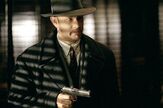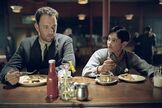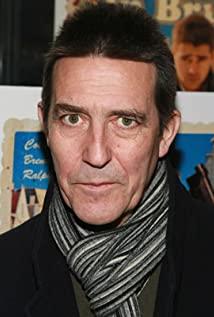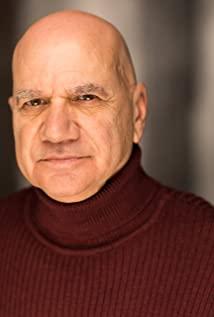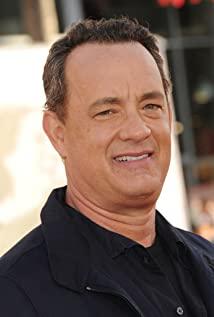And the memory officially begins, on the snow-covered hillside. The background was snow-white, and Mike was wearing a brown-black coat and black leather boots on a black bicycle. Leaving a black rut on the snow, the contrast with the environment is still great.
Then Little Mike walked in the opposite direction between the two pedestrians, the pedestrians were silent, and Little Mike sold newspapers all the way. The pedestrian on one side is next to the camera, and as the bicycle moves, the person quickly enters and exits the camera. It seems that pedestrians are more hurrying than bicycles. And Mike's youthful vigor is in stark contrast to the lifelessness of pedestrians.
Next is the scene of little Mike and Peter doing their homework. The two children are scratching their ears and scratching their heads and looking around, while the other is focused and writing, which also forms a contrast. Linked to the previous behavior of Mike stealing things and smoking, it is not difficult to imagine that he is a naughty child, and Peter is obviously much quieter and more well-behaved. When little Mike went to ask his father to have dinner, he showed a sense of awe and distance, and his father's response was also very indifferent. This is also for the later father to treat little Mike more harshly and to be closer to Peter; and until later, when little Mike fled with his father, he asked his father if he liked Peter more, and his father revealed his true feelings and said that he was worried that little Mike would become and Lay a foreshadowing yourself.
Next is the dining scene at the dining table. What is very interesting here is that little Mike leads the family in prayer. His honest and quiet image in front of his father also contrasts with his previous naughty image. The atmosphere at the table was solemn and dull, but the mother smiled happily, which also formed an interesting contrast.
Then Mike got in the car, called his father "sir" and respectfully listened to his father's instructions not to play dice at the funeral. However, after seeing the development of the plot, we will know that this is also a foreshadowing. The father didn't want Mike to play dice, more because he didn't want his son to have too much contact with the leader of the gang, Mr. Lonely, his boss.
In front of Danny's coffin, the two boys' expressions of fear and curiosity also formed a contrast. Next, Mr. Loney appeared for the first time. The two sons showed closeness as if they saw their grandfather. The father showed a vague unease, and the mother showed a restrained awe. Such a contrast makes it easy to guess what the identity of this old man is and what kind of relationship he has with the Mike family.
Then Danny's brother Finn spoke after a lighthearted address from Mr. Lonely. He looked thoughtful, sad, and hesitant to say anything. And when he was about to make a slip of the tongue, his father, Mike Sullivan, stopped him in time. Then we follow Mike's perspective and see that Sullivan and Connor are almost escorting Finn away, while Finn expresses dissatisfaction with Connor. Mr. Ronnie ordered the two to find Finn for a conversation. And it's not until the end that we connect the clues of the story. It was Connor who betrayed his father, and Danny and the Finn brothers were deliberately killed by him to take the blame.
Then go back to the timeline of the movie, the funeral dance, everyone sings and laughs. This also contrasts with the original atmosphere of the funeral. While Sullivan and Mr. Ronnie played the piano as close as father and son, Connor watched with a smile, and answered Peter "because of it all, it's crazy". He made a very subtle foreshadowing of the crazy and cruel behavior he carried out on the Sullivans. One thing worth analyzing about Connor's behavior is the contrast between his treatment of Sullivan, or the contrast between the surface and the heart. Especially after little Mike was found sneaking into his father's car, Connor's performance was very human and thoughtful, giving me the illusion that he actually had some affection for Sullivan. This was a huge contrast to his sudden harm to Sullivan, which strengthened the feeling of being caught off guard.
And Lonnie and Sullivan's rivalry is also a process of constantly forming contrasts. Feared but loved, Ronnie once showed tolerance and sincerity to Sullivan. But in the end, both sides met by force because they wanted to protect their son, and Sullivan killed Lonnie in a silent gun battle in the heavy rain. It was as if the silent cry from his heart also indicated that at that time he no longer belonged to this world, and was just doing everything he could to protect his son. It is worth mentioning that the rivalry between the two is always from the side. Even if they are facing each other, they are looking at each other at a 45-degree angle from left to right. I wonder if this means that there will always be twists and turns and insurmountable gaps in the relationship and emotion between the two.
The contrast in the film is also reflected in the rhythm. After Mike and his father fled, the rhythm suddenly became much lighter. And there are frequent humorous episodes, and the two people actually lost their relatives. On the road of escape and crime, this is an interesting contrast. And this kind of lightheartedness obviously comes from the heart of Little Mike, who is a story recaller.
In terms of plot, the entire film is full of many foreshadowings and foreshadowings that are long before and after the timeline, and are very detailed. Such as about the father's occupation, gloomy temperament, returning home with guns and dangerous props. Q&A and guesswork between Peter and Mike Jr. When Peter asked what his father was going to do, his mother was upset and unhappy. And little Mike was detained for a fight at school and did not go home to escape Connor's harm. And about the funeral that suddenly appeared, we combined Sullivan to call home, but the microphone was hanging, and the scene where the two escaped and called the aunt at the funeral, we can infer that it was Anne and Peter who were killed. funeral. And the killer whose face was damaged by the glass, he once said that he liked to photograph the dead, and finally we saw Sullivan being shot in the glass window, a man took a camera and took a picture of him dying, after seeing the thousand wounds Baikong's face, we understand everything.
These many foreshadowings and foreshadowings, compared with the flat and straightforward narrative method, make the audience unravel the mysteries one by one during the viewing process, and the surprises continue, making the film have a gravitational force that makes people engrossed all the time.
View more about Road to Perdition reviews





